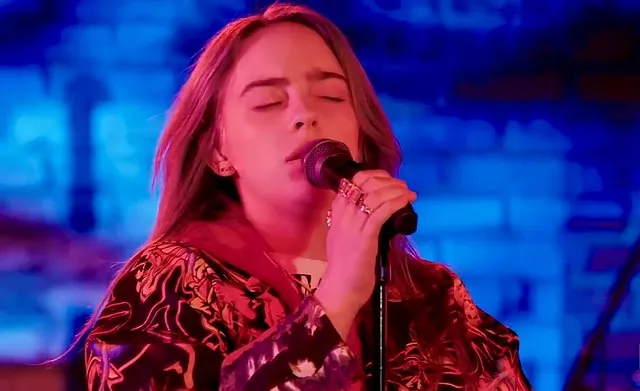19-year-old singer-songwriter Billie Eilish sends powerful messages of female empowerment and perseverance in her new album “Happier Than Ever.”
The album consists of 16 honest and personal tracks that Eilish wrote and produced with her older brother, Finneas. Eilish explores themes of female empowerment and finding personal strength — a departure from her previous album, “When We All Fall Asleep, Where Do We Go?” which features a dark, less hopeful tone touching on heavier themes like mental health and drugs.
“I can’t even process it. This was the most fulfilling, most satisfying and profound experience I’ve ever had with my music,” Eilish wrote in an Instagram post marking the release of her sophomore album.
Eilish begins the album with vulnerability, singing in a soft, calm voice about the struggles she has faced in her career and personal life, in the song “Getting Older.” Starting with a note of gratitude despite her struggles, she slowly opens her heart to her listeners, saying that she “crave[s] pity” and would lie “for attention,” only to get rejected in return. In the chorus, her smooth voice gets higher as she reflects on her life as a singer. The song progresses, and she shares that she has grown as a person while cleverly nodding to the title of her album: “I’m gettin’ better at admitting when I was wrong / I’m happier than ever, at least, that’s my endeavor / To keep myself together and prioritize my pleasure.”
“Getting Older” ends with a note of reassurance: Eilish concludes that she will find happiness despite the hardships that accompany spending most of her teenage years in the public eye. I love the honesty, hope and beauty in this song. Although she doesn’t sing loudly against a dynamic, electronic beat like in other parts of her discography, “Getting Older” holds even more power with its soft, stripped-down instrumentals.
The album’s ensuing tracks explore the end of a relationship and the start of a new one. Then comes track four, “My Future,” which was originally released as a single exactly one year before the album’s release; this song chronicles Eilish leaving a relationship and finding herself. She sings of her newfound independence and hope: “I’m in love / With my future / Can’t wait to meet her … I’m in love / But not with anybody else / Just wanna get to know myself.”
I adore the inspiring and refreshing nature of the lyrics in “My Future.” Eilish sings in what almost sounds like a lullaby, her voice layered soothingly in the background. Then, the beat changes to a faster rhythm, and drums join the accompaniment, signifying a sense of empowerment in a song sure to resonate with fans.
Eilish continues to explore the theme of female empowerment in the ninth track of her album, “Not My Responsibility.” But the song’s style sharply diverges from the album’s other tracks. Rather than singing over an electronic sound or soft beat in the background, she speaks over a static synth tone. Speaking — rather than singing — helps her emphasize her message and distinguish “Not My Responsibility” from the rest of her tracks. Denouncing how she is often judged by her physical appearance, she stresses that women should not be reduced to their bodies and clothing.
In the music video for the track, Eilish also departs from her omnipresent baggy clothing (which she wears to avoid sexualization of her body), and takes off her outer garments in a powerful statement. In reference to body-shaming she has faced for wearing oversized clothing, she sings, “Some people hate what I wear / Some people praise it / Some people use it to shame others / Some people use it to shame me / But I feel you watching / Always / And nothing I do goes unseen.”
Later, she speaks softly yet captivatingly as she poses rhetorical questions about her body to the audience: “Do my shoulders provoke you? Does my chest? / Am I my stomach? My hips? / The body I was born with / Is it not what you wanted?” As a young woman, I feel intimately impacted by Eilish’s message in “Not My Responsibility.” She leverages her musical talent to speak truth: women should never be judged by their physical appearance.
Eilish sends another powerful message in “Your Power,” which was released as a single in April. In the song, she reflects on an abusive relationship, singing, “I thought that I was special / You made me feel / Like it was my fault, you were the devil.” She sings hauntingly and beautifully with the sound of soft strumming in the background. Throughout this track, she tells her ex-boyfriend, “Try not to abuse your power.” On Spotify, under the Storyline, Eilish wrote, “I hope that all young women who have been taken advantage of feel heard.” I am awed by her ability to share her story so intimately — she once again sends a powerful message in reflecting on her personal experiences.
“Happier than Ever” is my favorite Billie Eilish album yet. Though each song is unique, she incorporates themes of female empowerment throughout. I would strongly recommend this album — not only because of Eilish’s beautiful vocals and heartfelt songwriting, but, perhaps most importantly, because of her sheer vulnerability.
